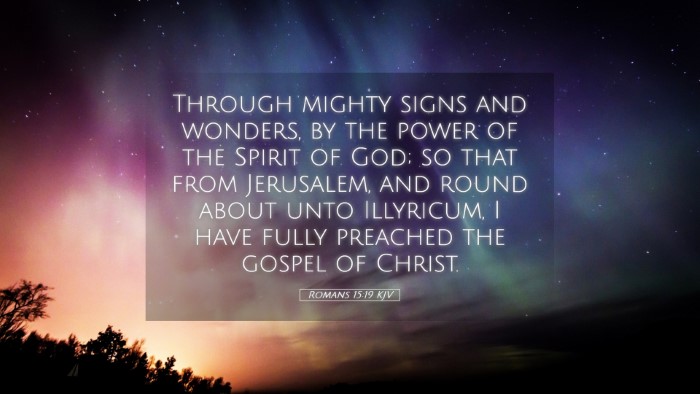Commentary on Romans 15:19
Verse: "Through mighty signs and wonders, by the power of the Spirit of God; so that from Jerusalem, and round about unto Illyricum, I have fully preached the gospel of Christ."
Introduction
This verse serves as a pivotal statement in the Apostle Paul's letter to the Romans, encapsulating the essence of his apostolic mission. It emphasizes the role of the Holy Spirit in authenticating the message he preached, showcasing the divine nature of his ministry through miraculous signs and wonders. This commentary draws upon insights from public domain commentaries by Matthew Henry, Albert Barnes, and Adam Clarke to offer a thorough understanding of this significant scripture.
Exegesis and Theological Significance
Romans 15:19 provides a profound insight into how Paul perceived his ministry and the impact of the Holy Spirit on it.
1. Signs and Wonders
Matthew Henry elaborates on the phrase “mighty signs and wonders,” noting that these were not mere spectacles but divine affirmations of the gospel’s truth. They served to confirm the preaching of the Word, demonstrating God’s power and presence among His people. Henry underscores that such signs were integral to authenticating the apostleship of Paul, aligning his ministry with that of Jesus and other apostles who performed miracles.
Albert Barnes further explains that signs and wonders were a necessary part of the early church's evangelistic work. These acts served to draw attention, instill faith in the beholders, and validate the apostolic message. Barnes points out that the occurrence of these miracles was not random; they were strategically placed manifestations of divine authority meant to accompany the preaching of the gospel.
2. The Power of the Spirit
The reference to “the power of the Spirit of God” indicates that Paul did not rely on human wisdom or eloquence but upon the divine enablement of the Holy Spirit. Adam Clarke notes the importance of spiritual empowerment in ministry. He emphasizes that true effectiveness in evangelism requires the working of the Spirit, as it is He who transforms hearts and convicts individuals of their sin.
3. Geographic Context
Paul mentions that he preached from Jerusalem all the way to Illyricum. Matthew Henry asserts the importance of this geographic scope, illustrating the rapid expansion of the early church. This journey underscores the fulfillment of the Great Commission and highlights the geographical diversity of the people reached by the gospel. Paul’s ability to traverse these regions reflects not only his commitment but also the effectiveness of the Holy Spirit's work through him.
4. The Mission of the Apostle
Paul’s statement “I have fully preached the gospel of Christ” shows his dedication to the task assigned to him. Albert Barnes comments that this reflects Paul’s desire to ensure that the message was clearly and thoroughly communicated. The term “fully” suggests completeness and thoroughness in his ministry, which was marked by both depth of teaching and breadth of influence.
Application for Today
This commentary on Romans 15:19 challenges modern-day pastors, students, and theologians to consider how they view their ministry in light of Paul's example.
1. Dependence on the Holy Spirit
In a world where human strategy often overshadows spiritual reliance, believers are reminded of the necessity of the Holy Spirit’s power. Adam Clarke encourages readers to seek spiritual gifts and empowerment in their ministries, recognizing that without the Spirit, their efforts may be in vain.
2. Validating the Gospel
The acts of signs and wonders, while not as commonly manifested today, can still be seen in the transformed lives of believers, answered prayers, and the moving of the Holy Spirit in communities. Matthew Henry encourages believers to seek these manifestations in their ministries, not for sensationalism but to genuinely reflect God’s power at work.
3. Committing to Reach All People
Paul’s example teaches the importance of reaching out beyond cultural and geographical boundaries. Albert Barnes emphasizes a heart for the lost and the necessity of sharing the gospel with diverse populations, echoing the call for contemporary believers to break down walls in their outreach efforts.
Conclusion
Romans 15:19 encapsulates the essence of the apostolic mission characterized by the miraculous works of God, the empowering presence of the Holy Spirit, and a commitment to the full proclamation of the gospel. It serves as both a historical account and a contemporary challenge for believers to reflect on the depth of their own commitment to Christ’s mission and the means by which they seek to fulfill it. As we meditate on this verse, may we be inspired to pursue our ministries with the same zeal and reliance on the Holy Spirit as Paul did, fully preaching the gospel of Christ in our context.


